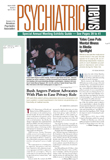The novelists Robert Stone, Denis Johnson, and Jim Shepard joined a trio of psychoanalysts at the New York University (NYU) School of Medicine in February to discuss creativity and imagination in the aftermath of September 11. The session, titled “The Apocalyptic Imagination: Daydreaming in an Era of Nightmares,” combined literary delight with a rare opportunity for the public to understand what clinical psychoanalysis is about.
At this installment, the fiction writers, all of whom write on apocalyptic themes, read excerpts from their works, and the analysts—Shelley Orgel, a psychoanalyst and clinical professor of psychiatry at the NYU School of Medicine; Salman Akhtar, a professor of psychiatry at Jefferson Medical College; and Jane Kite, a training and supervising analyst at the Psychoanalytic Institute of New England—commented on what they had heard from a psychoanalytic perspective.
The program, which attracted about 300 attendees, was sponsored by the Psychoanalytic Association of New York, the American Psychoanalytic Foundation, and the NYU Psychoanalytic Institute.
In a relaxed and witty atmosphere, the writers and the analysts told the audience about their perpetual endeavor to find the right words to express intense and troubling feelings and to reflect internal experience.
“They pull in every possible resource to explain the inexplicable, the fissures, the skids, and explosions in our lives. They turn the inside out; they use the external meticulously to make sense of the internal,” explained Jane Kite in her analysis of Jim Shepard’s short story, “Love and Hydrogen.”
In response to Orgel’s analysis of a passage from his best-selling novel Outerbridge Reach, Stone said he was “moved, pleased, and gratified.”
“I would like to say how worthwhile this makes me feel to have done a work that called forth such a degree of insight. A response to one’s work in terms of insight is the ultimate motive for fiction,” he said.
After the readings, the panel questioned the therapeutic virtues of writing and of creativity in general, and addressed the question of distance. How much distance is needed to write something aesthetically meaningful?
Both the writers and the psychoanalysts agreed that telling a story is a way of making sense out of individual and collective experience. They regarded writing and story telling as an attempt to give meaning to suffering and to the experience of life in general. Nevertheless, they could not reach an agreement as to its therapeutic dimension: is the process of writing itself therapeutic or is it merely about making stylistic, purely aesthetic, and quasi-musical decisions?
“Writing is like dreaming,” said Denis Johnson, after reading his short story, “Emergency.” “Is dreaming therapeutic? Looking back at it helps, but dreaming itself is not therapeutic. The same is true of writing.”
One concept the participants all agreed to was the virtue of humor as a means of deflecting some of the impact of a traumatic event and how that helps the writer to acquire necessary distance and to reach a certain amount of “safety” in the process of writing.
It is not clear whether fiction writers are more familiar with the analyst’s perception or the patient’s. One thing is sure: writers of fiction and analysts share the same task of carefully listening to psyches. ▪
